Doing Diversity Right
By Guest | November 20, 2016 |
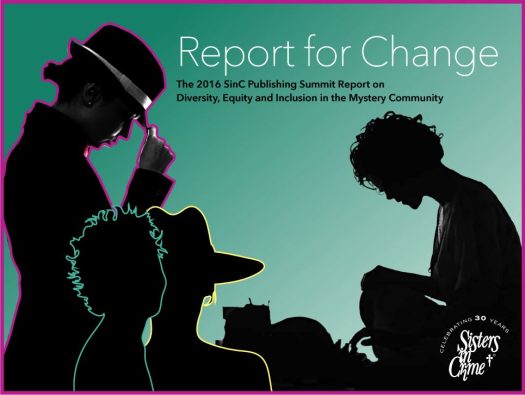 Can writers in the dominant culture be confident that they are speaking authentically, meaningfully, and vitally about this real America? In September at Bouchercon, Sisters in Crime held a workshop addressing the challenge of diversity. Panelists Frankie Y. Bailey, Cindy Brown, Greg Herren, and Linda Rodriguez join us at Writer Unboxed today to share some of the highlights and major takeaways, including, LGBTQ characters, disability in plotting, diverse settings and the extraordinary challenge of dialogue.
Can writers in the dominant culture be confident that they are speaking authentically, meaningfully, and vitally about this real America? In September at Bouchercon, Sisters in Crime held a workshop addressing the challenge of diversity. Panelists Frankie Y. Bailey, Cindy Brown, Greg Herren, and Linda Rodriguez join us at Writer Unboxed today to share some of the highlights and major takeaways, including, LGBTQ characters, disability in plotting, diverse settings and the extraordinary challenge of dialogue.
Frankie Y. Bailey is a criminal justice professor at the University at Albany (SUNY). A native Virginian, she writes a series featuring Southern crime historian Lizzie Stuart. Having spent much of her life in upstate New York, she also writes near-future police procedural novels featuring police detective Hannah McCabe–most recently What the Fly Saw. Her non-fiction focuses on crime history, and crime and mass media/popular culture. Frankie is a past president of SinC and a past EVP of MWA. Connect with Frankie on Twitter and Facebook and on her blog.
A former theater professional, Cindy Brown was the first director of ARTability, a national-award-winning organization that provides access to the arts for people with disabilities. She’s worked as an ADA consultant, written about accessibility for the Smithsonian Institution and the John F. Kennedy Center for the Performing Arts, and received the Mayor’s Award from the City of Phoenix Mayor’s Commission on Disability Issues in 2004. Cindy became a full-time writer in 2007 and is now the author of the Agatha-Award-nominated Ivy Meadows series, most recently Oliver Twisted, a madcap mysteries set in the off, off, OFF Broadway world of theater. Connect with Cindy on Twitter and Facebook.
Greg Herren is an award winning author and editor from New Orleans. He has written over thirty novels under his own name and various pseudonyms, edited twenty anthologies, and has published over fifty short stories. His most recent novel, Garden District Gothic, is the seventh Scotty Bradley mystery, He also edited this year’s Bouchercon anthology, Blood on the Bayou. Greg says, “As an out gay man who has been writing about gay and lesbian characters for over fifteen years, I would love to see more LGBT characters in mainstream works by mainstream writers.” Connect with Greg on Twitter, Facebook, and on his blog.
Linda Rodriguez’s book, Plotting the Character-Driven Novel, forthcoming this month, is based on her popular workshop. Her fourth mystery featuring Cherokee campus police chief, Skeet Bannion, Every Family Doubt, will be published in June 2017. Her three earlier Skeet novels—Every Hidden Fear, Every Broken Trust, and Every Last Secret—and her books of poetry—Skin Hunger and Heart’s Migration—have received critical recognition and awards, such as Malice Domestic Best First Novel, International Latino Book Award, Latina Book Club Best Book of 2014, Midwest Voices & Visions, Elvira Cordero Cisneros Award, Thorpe Menn Award, and Ragdale and Macondo fellowships. Her short story, “The Good Neighbor,” published in the anthology, Kansas City Noir, has been optioned for film. Connect with Linda on Facebook, on Twitter, and on her blog.
Doing Diversity Right
Naomi Hirahara speaking this year as part of Sisters in Crime’s Report for Change said, “Diversity is not something extra. This is what America looks like and crime fiction needs to reflect it.”
But can writers in the dominant culture be confident that they are speaking authentically about this real America? At Bouchercon in September, the SinC into Great Writing workshop addressed the challenges. Frankie Y. Bailey, Cindy Brown, Greg Herren, and Linda Rodriguez share highlights from their sessions here.
Frankie Y. Bailey–Writing Dialogue
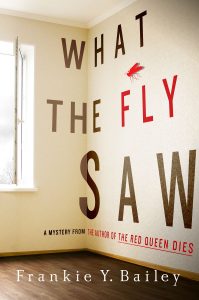 One of the challenges for a writer who creates a diverse, multicultural cast of characters is what happens when they interact. What happens when they talk to each other? Worried about “getting it wrong” and putting her foot in her character’s mouth, the author may write stilted dialogue.
One of the challenges for a writer who creates a diverse, multicultural cast of characters is what happens when they interact. What happens when they talk to each other? Worried about “getting it wrong” and putting her foot in her character’s mouth, the author may write stilted dialogue.
The solution to the problem is research. How do “intersections” (such as race/ethnicity, class, gender, sexuality) shape identities? What might be different about how a wealthy white male and a poor black woman experience the world? What are the “privileges” that the man takes for granted? What are the “microaggressions” (the daily insults, intentional and unintentional) that the woman experiences?
At the same time, how has each character’s unique experiences (such as the family he or she grew up in, hobbies, illnesses, pets owned) shaped who he or she is? How has occupational socialization shaped his or her world view?
Doing the research allows a writer to create three-dimensional characters who have conversations that ring true to who they are as people–not stereotypes.
Cindy Brown–Characters with Disabilities
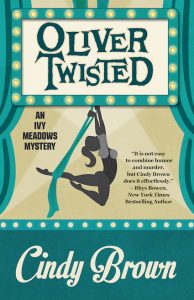 Should writers include characters with disabilities in their books? Definitely. Twenty percent of Americans live with a disability (that’s a lot of readers!). By including us, writers will accurately reflect their communities, and help us become more visible. Disability has been (and still is) too often hidden away. Writers can include characters with disabilities in any culture and/or time period, and be assured that they existed there. But by relying on empathy or imagination, writers make big mistakes. The old “I’ll blindfold myself to see what it’s like to be blind” exercise not only misses the true physical, cultural, and social barriers to a person who is blind, but creates woefully inauthentic (and sometimes even offensive) characters. All of us look at disability through different lenses or “models of disability.” The best way to create a realistic character with a disability is to interview someone with the disability being written about. And though online research is better than no research, interviews (in-person, online, or over the phone) will give writers the personal details that will make their characters ring true.
Should writers include characters with disabilities in their books? Definitely. Twenty percent of Americans live with a disability (that’s a lot of readers!). By including us, writers will accurately reflect their communities, and help us become more visible. Disability has been (and still is) too often hidden away. Writers can include characters with disabilities in any culture and/or time period, and be assured that they existed there. But by relying on empathy or imagination, writers make big mistakes. The old “I’ll blindfold myself to see what it’s like to be blind” exercise not only misses the true physical, cultural, and social barriers to a person who is blind, but creates woefully inauthentic (and sometimes even offensive) characters. All of us look at disability through different lenses or “models of disability.” The best way to create a realistic character with a disability is to interview someone with the disability being written about. And though online research is better than no research, interviews (in-person, online, or over the phone) will give writers the personal details that will make their characters ring true.
Greg Herren–LGBTQ characters
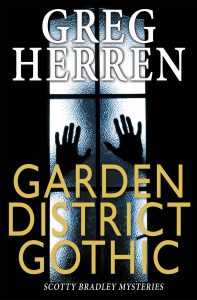 The thing to keep in mind when creating LGBTQ characters is that we aren’t any different from anyone else: our personalities and our behavior is shaped by experience from interaction with our parents, school, etc. We want the same things in life that everyone wants—to be happy, to be loved, to live in peace, to have security and not have to worry about keeping a roof over our heads and being able to pay the bills and eat. Whether we are writers or not, everyone in our lives is a character we’ve created. We don’t, in real life, have the ability to know every experience everyone we’ve known have had, how they think, how they will react to any given situation. This is why even people we think we know intimately can surprise us. Just know the truth of your characters. It doesn’t have to be on the page, but if you know their truth, it will show on the page.
The thing to keep in mind when creating LGBTQ characters is that we aren’t any different from anyone else: our personalities and our behavior is shaped by experience from interaction with our parents, school, etc. We want the same things in life that everyone wants—to be happy, to be loved, to live in peace, to have security and not have to worry about keeping a roof over our heads and being able to pay the bills and eat. Whether we are writers or not, everyone in our lives is a character we’ve created. We don’t, in real life, have the ability to know every experience everyone we’ve known have had, how they think, how they will react to any given situation. This is why even people we think we know intimately can surprise us. Just know the truth of your characters. It doesn’t have to be on the page, but if you know their truth, it will show on the page.
Linda Rodriguez–Writing About Other Cultures
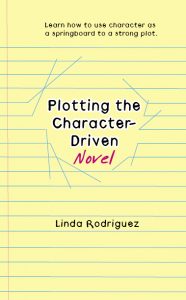 Writers must learn to portray cultures other than the mainstream. An artist must paint a true portrait of the world, not whitewash it. (See the full talk with resource list.)
Writers must learn to portray cultures other than the mainstream. An artist must paint a true portrait of the world, not whitewash it. (See the full talk with resource list.)
Some will be unhappy with your book. By writing about that Other, you may keep members of the culture from publishing books set in their own culture. A publisher who publishes your book about XYZ culture will often say to everyone else who submits, “We have our XYZ book already.”
Good research is vital. Regard those who first wrote about this culture as “unreliable narrators,” for they inevitably misunderstood informants and didn’t accept the culture as valid. Seek memoirs, fiction, or poetry written by members of the culture itself. Make friends from the culture (don’t try to exploit strangers) and ask for their help. Respect and courtesy are always important.
Dishonest, lazy portrayals of cultures of the Other play a major role in reinforcing the bigotry that causes hate crimes and everyday prejudice. You change the world for the better when you change that.
Now it’s your turn: Do you think writers in the dominant culture can be confident that they are speaking authentically, meaningfully, and vitally about this real America?










I’d say they can if they do their due diligence. One of the the issues with someone in the dominant culture creating a character outside their normal sphere of influence is the purpose of creating that character.
I’ve read books where the non-dominant cultures are as framed as pictures sitting on some office desk.
No one can relate to a static image that doesn’t react to the world at large. Not the readers, and definitely not the author. Characters need to live (and die) as the story demands, but I’ve never shed a tear for a picture that fell off a desk, or for a character as carefully framed.
I don’t think a person from the dominant culture should ever be confident of speaking for someone of a different gender, race, sexual orientation, able-bodiedness. Certainly as a writer, I can develop sensitivity for a person different from me but that sensitization is a never-ending process. That’s not a bad thing because writers are always learners, are we not?
But by all means we should attempt to write stories that reflect a diverse America. I am. My writing is informed from my experiences and diverse friends I have. I’m testing my stories through crit partners and beta readers. I’ll be seeking a professional editor to also vet my manuscript.
I like to think any errors I have are imperceptible rather than large and glaring. And hopefully errors open communication so that we can learn from one another and do better next time.
You have the right attitude, Lisa, and you’re definitely making the right kind of efforts to write about diversity accurately.
The other side of the diversity coin is the writer.
Diversity includes, though you might not realize it, disability. A lot of people have trouble navigating the real world; some of them just don’t bother leaving home much any more (which is why you don’t see them).
Writers with disabilities may have a harder time writing, publishing, and marketing. Everything is harder, for example, when you have extremely limited energy each day.
This doesn’t mean our standards are necessarily lower – it means that it may take us a lot longer to achieve them.
Then there is the whole area of ‘disability p0rn,’ which many of us find offensive: the use of disability for inspiration of the able – ‘if a man in a wheelchair can do it, so can you!’
Finally, there’s a disturbing thread in the literary world: the one which says that the only ‘solution’ to a disability is for the person with it to tidy himself out of life (You Before Me, Million Dollar Baby) to avoid bothering the ‘real’ people.
Add to that writing a disabled character, as I do, and the efforts can be overwhelming. And marketing can be almost impossible.
They say writing is an addiction, an obsession; I can attest to that. Nothing less would keep me at it.
But it is a bit like showing up for the Olympic swimming events and being required to compete while wearing full fireman’s gear.
To be perfectly clear: I’m just pointing out the verities. Not complaining. Writing is a precious gift; it keeps me sane.
Alicia, you are absolutely right — disability is too often left out of conversations on diversity. That’s why Sisters in Crime consciously chose to include disability in our Report for Change, and to include disability rights advocate-turned-mystery writer Cindy Brown at our recent workshop, which inspired this piece. As immediate past president, I’m pleased to say SinC looks forward to discovering more ways we can build and support a truly diverse community of writers.
Yes, Leslie, and Cindy did a marvelous job of discussing a broad range of issues when writing characters with disabilities, as well as why it’s so important to include many more characters with disabilities within all of our books.
Amen, sister.
As a disabled writer -in wheelchair with multiple sclerosis – I try to include diverse characters, but I have to admit as from the dominant culture, I find it hard. My debut book had some struggling with diabetes, so I did a lot of interviews for that. Main WIP has two heroines from different kinds of minorities – a Romany gypsy accused of murder and the female Welsh detective. Okay Welsh is still white but under the English they had to fight for their rights, language and still are. Also attempting to write a novel with a part-Chippewa heroine. – not easy
Roland, I applaud your efforts at writing diversity. I suggest you try to get feedback from someone who’s actually Roma and someone who’s actually Ojibwe. The Roma and all Native nations are particularly plagued with horrible stereotypes, even in much scholarly literature until fairly recently. This makes it difficult to write accurately about them simply from library and online research. Best of luck in your efforts.
One thing that I have noticed in my research is how varied the Roma are, even between North and South Wales – my story is set in the north. At the moment, my core reference is a book about the North Wales Roma by two of the tribe, and direct descendants of the most notable one. Once I have a reasonable draft, I will attempt to approach them direct, so as to avoid the stereotypes.
I will do the same with the Ojibwe, helped by being in the US, though not in their area – Shoshoni and Bannock here,
Hey Crew:
The panel that related to your workshop, with Catriona McPherson moderating, was one of my absolute favorites at the convention.
I have nothing particularly meaningful to add to your excellent remarks, except this quote from John Coltrane:
“When there is something you do not understand, you must go humbly to it.”
That’s the best advice I can think of concerning writing about characters whose life stories differ significantly from one’s own.
All the best to each and everyone of you, and have a marvelous Thanksgiving.
Thank you, David! I love the Coltrane quote–and it’s perfect for this undertaking of writing diversity. I hope you have a happy holiday, as well.
So happy to see other writers with disabilities chiming in, and want to thank SinC again for including us.
One of my favorite takeways from the panel was from Walter Mosely (our keynote speaker), who suggested that we could avoid stereotyping the Other by making all of our characters real and well-rounded. So simple and so true–though not so easy.
I recently met a Sensitivity Reader at a writing workshop. There is a website called Writing in the Margins where an author can choose a sensitivity reader and get feedback on specific issues, such as race, gender, sexuality, socioeconomic, disability. Most readers charge $250 to give feedback on a book. Full disclosure: I may become a sensitivity reader on the site for LGBTQQIA or socioeconomic issues. There are people available to help us get “it” right, whatever it is.
I had this discussion with a friend who won an Emmy for a screenplay. His position was that you, the artist, have enough imagination to put yourself in the place of whomever you need to. Upon reflection, I think perhaps that there is something to what he said. For instance, if someone acts like an asshole to me (tall, blue-eyed, anglo, born in Ohio in the middle of the 20th century,) they’re an asshole. If I were black and somebody acted like an asshole toward me, maybe they’re an asshole, maybe they’re something else. How would I know? That simple fact is going to put an entirely different spin on the worldview of two otherwise similar characters.
No. Empathy and imagination are important, but without research, you can easily miss huge circumstances you need to have the empathy *about*.
Take, for example, childbirth as depicted by TV. For years and years, many or most times I’ve seen it on TV it’s been presented as a pretty normal thing to have a labor that lasts maybe an hour or two. HA! Um, no. NO. (Really? You couldn’t show some kind of time lapse? A reasonable one, not a truly laughable one?)
And that’s a shockingly basic thing, affecting a group that isn’t even a minority. Do none of these writers have kids? Were they paying ANY attention? Do they not have Google? Or did they just decide that with a bit of empathy and imagination they can write a character having a baby, because after all, they’ve seen it on TV before themselves, they know what happens, more or less. Enough for some off-screen sweeping strokes, it’s not like they’re going to show it in detail, anyway.
As I mentioned in the article, I think research is incredibly important. For example, a writer told me that it must be incredibly frightening to be blind,because that’s how she felt when she imagined it. She was very surprised when I told her that none of my friends who are blind are fearful. An interview or two would have helped her see that.